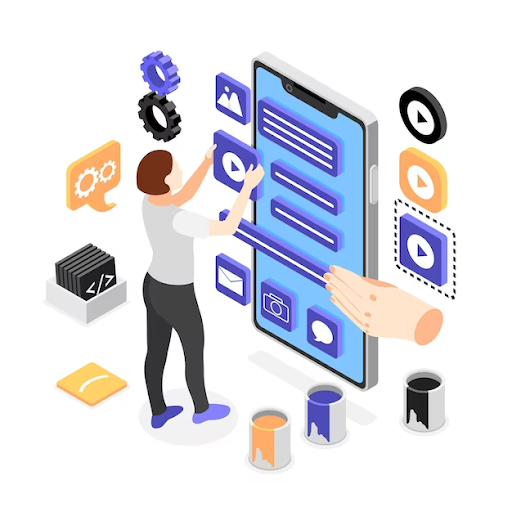Unveiling the World of Android Application Development
In today’s technology-driven world, where smartphones have become an integral part of our lives, the demand for innovative and user-friendly mobile applications continues to rise. Among the various platforms available for app development, Android stands tall, dominating the global market share. Android’s open-source nature and extensive user base make it a prime choice for businesses and developers alike. As the digital landscape evolves, the question arises: What is the easiest way for Android app development?
The Power of Android Application Development
Android, developed by Google, has revolutionized the way we interact with technology. Its flexibility, customization options, and user-friendly interface have created an environment ripe for application development. From gaming and entertainment to productivity and e-commerce, Android applications span various industries, catering to diverse user needs.
With over 2.5 billion monthly active devices running on the Android platform, developers have an incredible opportunity to reach a vast audience. This ecosystem’s inclusivity empowers developers to create apps that serve both mainstream users and niche markets, thereby boosting the app’s visibility and potential for success.
The Android Advantage: Custom Mobile App Development
Custom mobile app development lies at the heart of the Android advantage. Tailoring applications to specific business requirements and user preferences has never been easier. This is where the phrase “hire Android app developer” comes into play. Collaborating with skilled developers can transform an app idea into a functional reality that resonates with the target audience.
The process of custom mobile app development involves not only coding but also a deep understanding of user behavior and market trends. Professional developers immerse themselves in market research to identify gaps and opportunities, ensuring that the app they create is not just functional, but also aligned with user expectations.
Unwrapping the Android Development Process
- Creating a successful Android application involves a well-structured process that maximizes efficiency and creativity. Here’s a simplified breakdown of the steps:
Idea Generation and Conceptualization:
- Identify the purpose and functionality of your app.
- Research the market to understand user demands and competition.
Design and Wireframing:
- Create a user interface (UI) design that aligns with your app’s purpose.
- Develop a wireframe to outline the app’s layout and navigation.
Development:
- Select a programming language, such as Java or Kotlin, for coding.
- Leverage Android Studio, the official integrated development environment (IDE) for Android app creation.
- Implement features and integrate functionalities, focusing on a seamless user experience.
Testing:
- Thoroughly test the app for functionality, usability, and compatibility.
- Identify and fix bugs, ensuring a smooth performance across various devices.
Deployment:
- Register as a developer on the Google Play Store.
- Create a listing with engaging visuals and a compelling app description.
- Launch the app to the public, making it available for download.
Post-Launch Support and Updates:
- Gather user feedback and analyze app performance.
- Continuously update the app to introduce new features and improvements.
Exploring Different Approaches to Android App Development
When it comes to Android application development services, there are multiple avenues developers can take:
Native App Development:
- Utilizes platform-specific languages (Java/Kotlin).
- Offers optimal performance and full access to device features.
- Ideal for resource-intensive applications like games.
Cross-Platform App Development:
- Uses frameworks like Flutter or React Native.
- Enables code reusability across multiple platforms.
- Speeds up development but might sacrifice some performance.
- Developers need to carefully evaluate these approaches based on factors such as project requirements, budget constraints, and the desired user experience. The choice of development approach can significantly impact the app’s performance, development timeline, and long-term maintenance.
The Easiest Way: Custom App Development and Hiring Android App Developers
While various app development paths exist, the easiest and most effective approach often involves hiring skilled Android app developers. This brings us back to our secondary keyword, “hire Android app developer,” which encapsulates the expertise needed to craft exceptional applications. Here’s why this approach stands out:
Expertise and Experience:
- Professional developers possess a deep understanding of Android’s architecture and best practices.
- Their experience enables them to navigate challenges efficiently and create robust apps.
- Customization:
- Hiring developers allows for tailored app development, aligning with your business goals and user preferences.
Efficiency:
Skilled developers can optimize the development process, ensuring timely delivery without compromising quality.
Quality Assurance:
Professional developers conduct rigorous testing to identify and rectify issues before launch.
This guarantees a seamless user experience and positive reviews.
Collaborating with a team of developers also fosters a creative environment where ideas can be brainstormed and refined. This synergy often leads to the incorporation of innovative features and functionalities that set the app apart from competitors.
Embracing the Future of Android App Development
As the Android ecosystem continues to evolve, developers must stay abreast of emerging trends to create impactful applications:
Artificial Intelligence (AI) Integration:
- AI-driven features, such as chatbots and personalized recommendations, enhance user engagement.
5G Compatibility:
- With the advent of 5G technology, apps need to be optimized for faster data speeds and low latency.
Internet of Things (IoT) Connectivity:
- Android apps can leverage IoT to communicate with smart devices, offering enhanced functionality.
- These trends not only provide opportunities for developers to create cutting-edge applications but also ensure that their creations remain relevant and valuable in a rapidly changing technological landscape.
In Conclusion
Android application development is a dynamic and rewarding journey that requires careful planning, creativity, and technical prowess. While various approaches exist, the path of custom mobile app development, coupled with hiring experienced Android app developers, remains the easiest and most efficient route to success. As technology continues to advance, embracing the latest trends ensures that Android applications remain relevant and impactful in the lives of users worldwide. Whether it’s a gaming app, a productivity tool, or an e-commerce platform, the Android ecosystem welcomes developers to craft solutions that enrich the lives of millions.



